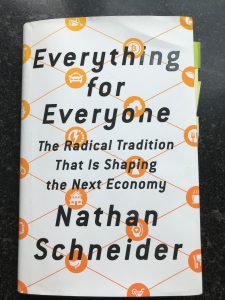I recently spent some time with Nathan Schneider in Boulder, Colorado. He’s a Media Studies professor at the University of Colorado Boulder and the author of a new book, Everything for Everyone: The Radical Tradition That is Shaping the Next Economy. I recommend it!
Let me connect some dots as to how the book relates to community-owned renewable energy, and then I’ll highlight some of the book’s key takeaways. The reason AIRE works in this renewable energy niche (as opposed to corporate, utility-scale solar for example) is that we believe in community self-reliance, local ownership, benefit and control. This set of values, where cooperation is central, makes way for what could be transitional paths to clean energy that allow for communities to build their own wealth and wellbeing instead of being reduced to essentially powerless “rate payers” contributing to the massive profits of large investor-owned utilities. This book calls out extractive economics by name, including shining light on the myth that some familiar so-called “sharing economy” bonafides are in reality extractive. Community-owned renewable energy is a way of keeping dollars in a local economy. Our work and experience tells us that it’s possible and necessary to rethink how we scale up solar and improve wellbeing. In reality this is easier said than done.
This is where Everything for Everyone comes in. It offers a historical view of the likes of America’s rural electric cooperatives, and the often cited Mondragon in Spain or Emilia-Romagna in Italy. What I find most useful is Nathan’s descriptions of the cutting edge of cooperatives of all kinds, which are a departure from these earlier models, although he would argue that we should draw from that history as we create new forms. He’s done some in depth field research on the new ways of thinking about what it means to cooperate, to create and sustain cooperatives. The emerging culture of cooperatives, which sees the downside waste of bureaucracy, is captured in this line- “pioneering types of people…if they’re organizing co-ops, often treat the required board structures as a legal formality and govern themselves more like an open-source software project–whether they’re writing code or growing vegetables. They’re forgoing co-op language altogether…” (page 231). Radical in the title might be off putting to some, but in fact, the history of cooperatives, as the author chronicles, shouldn’t elicit the left/right, red/blue, liberal/conservative partisan kinds of first impression. In fact, he notes that both Bernie Sanders and Mike Pence support cooperatives of various types (page 232).
A decade ago, AIRE had the late, great Frank Adams as a wayfinder and mentor. Our aspiration then was to create a larger framework through which we could develop renewables– cooperatives and a federation linking them together and supporting them. We were unable to live up to Frank’s vision then, but maybe now’s the time.
Cooperation is so important now. Building solar in our communities would be better served and a byproduct would be improved connection, cohesion, hope and health; something much needed these days. Maybe it could be easy. Nathan talks about starting the Colorado Co-ops Study Circle, which he said began with he and one friend, but before long 40 people were coming to meetings. Now as a result, there are quite a few cooperatives on the Front Range (Boulder-Denver area) including some in solar power. Ultimately, Everything for Everyone suggests that democracy is possible if we truly want to practice it, which, for me includes the possibility of democratic energy.